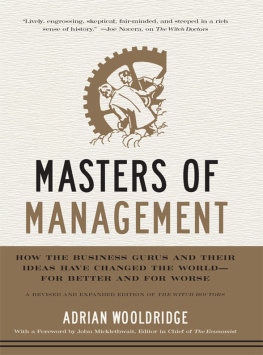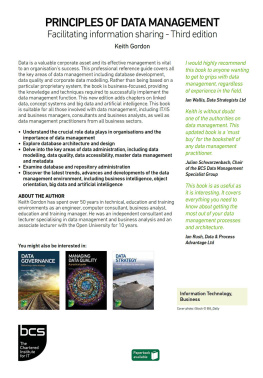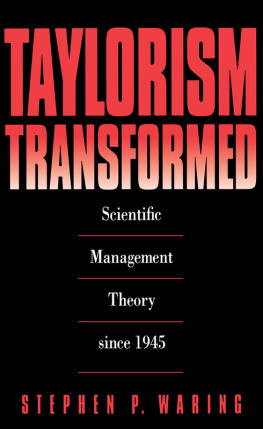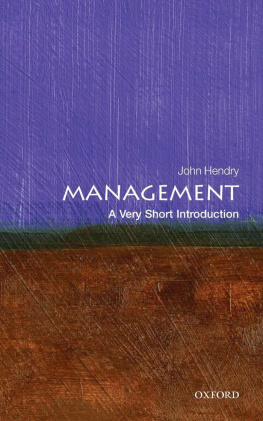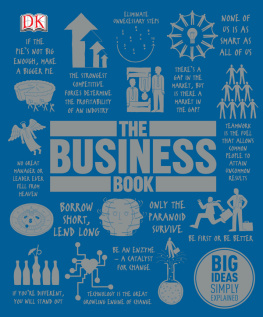MASTERS OF
MANAGEMENT
HOW THE BUSINESS GURUS
AND THEIR IDEAS HAVE
CHANGED THE WORLDFOR
BETTER AND FOR WORSE
ADRIAN WOOLDRIDGE
With a Foreword by John Micklethwait

An Imprint of HarperCollins Publisher
www.harpercollins.com
MASTERS OF MANAGEMENT. Copyright 2011 by Adrian Wooldridge. All rights reserved under International and Pan-American Copyright Conventions. By payment of the required fees, you have been granted the non-exclusive, non-transferable right to access and read the text of this e-book on-screen. No part of this text may be reproduced, transmitted, downloaded, decompiled, reverse engineered, or stored in or introduced into any information storage and retrieval system, in any form or by any means, whether electronic or mechanical, now known or hereinafter invented, without the express written permission of HarperCollins e-books.
FIRST HARPERCOLLINS EDITION
A previous edition of this book was published by Crown Business in 1996 under the title The Witch Doctors.
Library of Congress Cataloging-in-Publication Data has been applied for.
EPub Edition DECEMBER 2011 ISBN: 9780062096722
ISBN: 978-0-06-177113-2
11 12 13 14 15 OV/RRD 10 9 8 7 6 5 4 3 2 1
Contents
I am most grateful to Scott Moyers, formerly of the Wylie Agency, for suggesting that I should produce a new version of The Witch Doctors, which John Micklethwait and I published in 1996, and for gently persuading my publishers to put up with my slow progress; and to Andrew Wylie and the Wylie Agency in general for looking after my book-related life so wonderfully.
Writing this book has proved both more difficult than I had anticipated and more fulfilling. More difficult because I was guilty of underestimating the force of Heraclitus observation that you cannot step into the same river twice, particularly in an age when the river has turned into a raging torrent. More fulfilling because the business landscape has been transformed dramatically over the past fifteen years, shaken by the Internet, the rise of emerging markets, and sundry smaller changes. Having spent the first decade of this century writing about American politics, I was happy to turn to a world where problems are routinely addressed, rather than just swept under the carpet, and where progress is a condition of staying in business.
It is a pleasure to be able to acknowledge my debt to the dozens of people whose brains I have picked during the writing of this book: Antoine van Agtmael, Sir Ronald Cohen, Ge Dingkun, Suren Dutia, Wim Elfrink, Juan Antonio Fernandez, Bill Fischer, V. G. Govindarajan, Lynda Gratton, Michael Hay, Daniel Isenberg, Joe Lassiter, Michael Jacobides, Rosabeth Moss Kanter, Tarun Khanna, Vinod Kumar, A. S. Lakshminarayanan, Robert Litan, Sandeep Maini, Arnoud De Meyer, George McKinnon, Nitin Nohria, Charles Ormiston, Jaideep Prabhu, C. K. Prahalad, Gideon Rachman, Navid Radjou, Sumanth Raman, V. Raja, Michael Roberts, Carl Schramm, Richard Straub, A. R. Srinath, Donald Sull, Ratan Tata, Jianmao Wang, and Dongsheng Zhou. They are not only masters of management but paragons of generosity, too.
At HarperCollins, I am most grateful to Hollis Heimbouch and her team. Hollis was everything an errant author could hope for: she identified gaps in my coverage, suggested innumerable improvements, and guided my re-editing, and all without raising her voice or ruffling any of my feathers.
I am grateful to numerous colleagues at The Economist who have had to put up with me at close quarters while I was distracted by this book, and who did me various kindnesses, large and small, in particular Joel Budd, Robert Guest, Daniel Franklin, Ludwig Siegele, Tom Standage, Rachel Horwood, and Sheila Allen. I am also grateful to The Economist for allowing me to reuse some passages that I originally wrote for its pages. The Economist continues to be what it has always been in the twenty-odd years that I have worked there, a perpetually engaging and endlessly stimulating seminar that somehow manages to produce a magazine every week, and, these days, a torrent of Internet commentary as well. John Micklethwait supported this book in much the same way that I support the Church of England: as a buttress from the outside.
The burden of book writing inevitably falls on those closest to you. I am eternally grateful to Amelia, who had to do more than her fair share of labor involved in moving continents and supervising building operations; and to Ella and Dora, who put up, not altogether uncomplainingly, with my book-writing duties. My dogs, Louis and Dolly, were constant sources of delight.
W hat if the Female Manager of a High School Baseball Team Read Druckers Management is hardly the catchiest title for a novel. But in 2010, What if became one of the great success stories of the Japanese publishing industry, selling more than a million copies. The novel, by Natsumi Iwasaki, told the story of a teenage girl, Minami, who becomes a go-fer dogsbody for a baseball coach. Horrified by the teams lack of ambition, she sets about putting some steel into its collective spine, setting the team the goal of reaching the high school championships. But how can she turn second-rate rabble into a prize-winning team? As she searches for inspiration, she stumbles across Peter Druckers 1973 masterpiece, Management: Tasks, Responsibilities, Practices. Minami quickly learns the importance of setting clear objectives. (Objectives are not fate, Drucker wrote, they are direction.) She then embraces Druckers various principles as embodied in the titles of the books chapters: Minami addresses marketing, Minami tries to harness peoples strengths, Minami takes on innovation, Minami thinks about what integrity is.
Drucker has long been venerated in Japan, as a man who helped teach Japanese managers how to run businesses (and also explained Japan to the world). Minamis antics quickly produced a Drucker boom. Management sold some 300,000 copies in the first half of 2010, three times more than it had sold in the previous twenty-six years. Iwasaki donated some of her royalties to the Japan Drucker Workshop and the Peter Drucker and Mastoshi Ito Graduate School of Management. But the novel did more than this: it promoted a salutary debate about the business habits of a country that, thanks in part to Drucker, had shaken up the business world in the 1960s and 1970s with a succession of management innovations, such as lean production and just-in-time delivery, but has been locked in a recession for two decades. Should Japanese companies set themselves clearer objectives rather than wallowing in consensus? And should they adopt clearer structures rather than sprawling into dozens of businesses? Five years after his death, Drucker still mattered.
In 1996, Adrian Wooldridge and I published a book on the management gurus called The Witch Doctors. It did not sell quite as many copies as What if , but it did well. We were lucky in our timing. Over the previous decade the management theory industry had been rapidly expanding its empire. Reengineers were tearing apart companiesand sacking thousands of workers in the processin the name of corporate efficiency. Tub-thumping gurus such as Tom Peters and Gary Hamel were wowing managers with lectures on how they ought to leap on the latest management theory bandwagon or face destruction. Business schools and management consultancies had their pick of the worlds best and brightest.
But as we wrote The Witch Doctors

